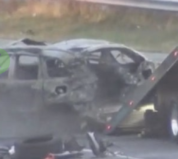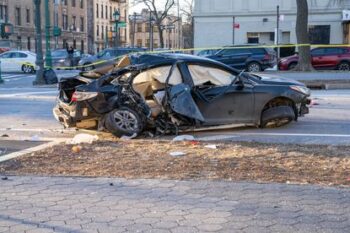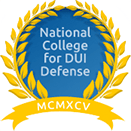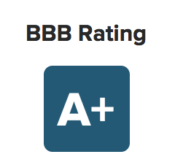Our Talented Criminal Team Includes Former County Prosecutors Who Have Handled Countless Vehicular Homicide & Aggravated Manslaughter Cases

Vehicular homicide charges are filed when an automobile accident results in death and is caused by recklessness, for example, speeding excessively or driving while intoxicated. Companion charges of aggravated manslaughter and aggravated assault are also commonplace in this context. These are all severe crimes that can result in years of imprisonment, whether the situation arises out of alcohol, drugs/cds, or some other claim of reckless conduct. If you were arrested for recklessly causing the death of another person anywhere in New Jersey you certainly need to select the very best attorney you can afford given the penalties you will face if convicted of vehicular homicide or aggravated manslaughter.
We are the Law Offices of Jonathan F. Marshall, one of the largest and most highly credentialed criminal firms in the state. Our team has the skills and know-how to ensure you obtain the best possible defense, including:
- Over 200 years of combined experience defending clients charged with aggravated manslaughter and vehicular homicide stemming from drunk driving, operating under the influence of drugs and other reckless behavior
- 13 lawyers that limit their practice exclusively to criminal defense
- Former county prosecutor that served as Director of Major Crimes, Trial Division and even in Homicide
- Certified criminal trial attorneys
- Offices located throughout New Jersey to conveniently serve clients
If you were in a motor vehicle accident and the crash resulting in a charge for vehicular homicide, we are well-positioned to help you. To speak to an attorney with the knowledge and skill to represent you at an initial appearance, detention hearing successfully, or at any other stage of your case, contact us anytime 24/7 at 855-450-8310.
I. Reckless Vehicular Homicide Offense
The criminal charge of vehicular homicide, which is also referred to as death by auto, vehicular manslaughter, and reckless homicide, is set forth at N.J.S.A. 2C:11-5. An individual commits this second degree crime if they cause the death of another person “by driving a vehicle or vessel recklessly.”
The New Jersey Model Jury Charge for Vehicular Homicide sets forth three (3) elements that must be established, beyond reasonable doubt, in order for a jury to convict a driver for second-degree reckless vehicular homicide/manslaughter. First, the state must prove that the defendant operated a motor vehicle. Second, he or she must have operated recklessly. There is an inference that a motorist was driving recklessly under this law if he/she:
- Fell asleep at the wheel or went 24 consecutive hours without sleep;
- Was driving while intoxicated (e.g., a blood alcohol concentration of .08% or higher) or under the influence of drugs (e.g., marijuana, cocaine, heroin, prescription medication, etc.) in violation of N.J.S.A. 39:4-50;
- Was operating a hand-held while driving in violation of N.J.S.A. 39:4-97.3; or
- Failed to maintain his/her lane in violation of N.J.S.A. 39:4-88.
It is important to understand that these aren’t the only ways that recklessness can be established. In fact, any operation that “consciously disregards a substantial and unjustifiable risk of death” such as, for example, driving at an exceptionally high rate of speed, racing, or weaving in and out of traffic can form the basis for a criminal complaint or indictment for vehicular homicide. The third element of proof in a vehicular manslaughter case is that the accused caused the death of another (i.e. the death would not have occurred “but for” the defendant’s conduct).
Escalation to a First Degree Crime Under 2C:11-5. There is a fourth element of proof that must be established when someone is charged with first-degree vehicular manslaughter (a.k.a. vehicular homicide), namely, that the motorist’s conduct occurred in a School Zone and involved operation in violation of N.J.S.A. 39:4-50 (i.e. driving while intoxicated or under the influence of drugs) or breath test refusal.
Proving Recklessness Based On Intoxication. Intoxication can clearly be construed as reckless conduct and form the basis for a vehicular manslaughter offense. Typically, blood alcohol concentration (“BAC”) is the primary tool for proving intoxication and an excessive level can be indicative of reckless conduct; the point being that someone needed to ingest an extreme level of alcohol to achieve, for example, a .29% BAC reading, and operating a motor vehicle after that level of consumption manifests recklessness. Conversely, operation with a BAC at or near the legal limit of 08% has a tendency to support a lack of reckless conduct given the slight nature of the misjudgment. A core component of the prosecutor’s case in a vehicular homicide case based on DWI is BAC at the time of the accident and this requirement often proves to be a fertile area for attack by a skilled NJ vehicular homicide defense lawyer. There are many ways to challenge the test result including contamination, improper chain of custody, or poor preservation of the blood sample, failure to follow proper protocol for testing, defects in the testing device(s), defective certifications for the laboratory scientist, and others.
II. Strict Liability Vehicular Homicide
In 2017, New Jersey lawmakers created a separate third-degree crime that is strict liability in vehicular homicide cases. The specifics of this modification are contained in N.J.S.A. 2C:11-5.3 and make it vehicular manslaughter to cause the death of another “by driving a vehicle while intoxicated…or operating under the influence of alcohol or drugs”. While this law sounds very similar to N.J.S.A. 2C:11-5 (i.e. second-degree vehicular manslaughter), a significant element does not have to be established in order to secure a conviction, that is, reckless operation. As long as the accused was driving while intoxicated or under the influence and caused an accident, the offense has been established.
Elements of Proof Under 2C:11-5.3. There are also three (3) elements of proof in a strict liability case of vehicular homicide and they are: (1) that the defendant was driving a vehicle; (2) he/she caused the death of another person; and (3) the death was caused by driving a vehicle while intoxicated or under the influence of drugs in violation of N.J.S.A. 39:4-50.
Penalties for Vehicular Homicide

The penalties for second-degree vehicular homicide, which is a form of manslaughter, include 5-10 years in prison and a potential fine of $150,000. First-degree vehicular homicide (i.e. school zone death by auto) carries 10-20 years in prison and a maximum fine of $200,000. The No Early Release Act (“NERA”) applies in either context, requiring a defendant to serve 85% of his/her term of imprisonment before being eligible for parole.
The penalties for third-degree vehicular homicide include up to 5 years in prison and a potential fine of $15,000. You should also know that the presumption of non-incarceration that typically applies to a third-degree crime does not exist if someone is convicted of violating 2C:11-5.3. This means that there is definitely a possibility of imprisonment for someone convicted for third degree strict liability vehicular homicide.
Possibility of Consecutive Sentences in Auto Fatality Cases. When there are multiple fatalities, or there is a fatality along with surviving motorists who were injured in the accident, there is the potential for multiple prison sentences that can be treated consecutively. What this means is that a defendant convicted under this scenario can be subjected to multiple prison sentences (e.g. 8 years on the vehicular homicide and 7 years on the second degree aggravated assault) and the time can be imposed consecutively so that the combined time is actually how long the defendant will have to serve.
Aggravated Manslaughter In Addition to a Vehicular Homicide Charge
The focus of this discussion has been on the offense of vehicular homicide, including reckless homicide and strict liability homicide, but you should also be aware of the potential for an additional charge in this realm — Aggravated Manslaughter. This first degree crime comes into play in motor vehicle death cases where the conduct of the accused is under circumstances manifesting extreme indifference to human life. The prison term for aggravated manslaughter is 10-30 years in prison with no possibility for parole until at least 85% of the sentence is served (i.e. NERA requirement).
Second Degree Aggravated Assault in Auto Death Cases
Under N.J.S.A. 2C:12-1b(1), an individual commits a second degree crime for aggravated assault if he/she recklessly causes serious bodily injury under circumstances manifesting extreme indifference to the value of human life. This represents a separate offense that someone can also face if they recklessly kill someone in a car accident. The prison term is 5-10 years for second degree aggravated assault. NERA requires that the defendant serve at least 85% of the term imposed before they are eligible for parole.
Accomplished NJ Vehicular Homicide Lawyers At Our Firm Are Ready To Defend You
A criminal charge that involves any form of homicide (a.k.a. murder) is just about as serious as it gets in New Jersey. Hiring an attorney who is highly experienced in defending vehicular homicide violations is an absolute necessity given the extreme stakes. The attorneys at the Law Offices of Jonathan F. Marshall have precisely what you need with decades defending death by auto cases throughout the state. If you would like to speak to a lawyer on our team in a free initial consultation any time of day or night, call 855-450-8310.
Frequently Asked Questions in Auto Death Cases
Vehicular Homicide
Is Vehicular Homicide a Crime of the First Degree or Second Degree?
Vehicular homicide is typically a second-degree crime but is enhanced to a first-degree crime if the violation involves DWI, DUI, Breath Test Refusal in a School Zone.
How Does an Aggravated Manslaughter Charge Come Into Play In a Vehicular Homicide Case?
Aggravated manslaughter is a lesser included offense of Vehicular Homicide. It is common for prosecutors to file both charges when there is evidence of recklessness in a motion vehicle fatality case. The two offenses often get confused or intermingled with labels like vehicular manslaughter and aggravated vehicular manslaughter.
What Is The Difference Between a Vehicular Homicide Charge Under 2C:11-5 Versus 2C:11-5.3?
There are two primary distinctions between third-degree vehicular manslaughter and the second-degree variety of this charge. First, there is no requirement that the state establishes recklessness in order to secure a conviction for a third-degree offense under 2C:11-5.3 (i.e. strict liability case). The second major difference is that proximate cause must exist in order to convict someone for violating 2C:11-5 (i.e. second degree) whereas it is no defense in a strict liability case “that the decedent contributed to his own death by reckless or negligent conduct or operation of a motor vehicle or vessel.”
Can Someone Be Convicted for Vehicular Homicide If They Were Negligent In Causing An Accident Resulting in a Death?
No. Negligence is the failure to operate a motor vehicle with due care and is akin to carelessness. In contrast, vehicular homicide requires a much higher showing of recklessness, the conscious disregard of a known and substantial risk of death.
How Long Do You Go To Prison For Killing Someone As The Result of Drunk Driving?
The potential prison term in New Jersey for causing the death of another as a result of DWI hinges on whether the conviction is for first-degree, second-degree, or third-degree vehicular homicide. The prison term for vehicular manslaughter is 10-20 years for a first degree, 5-10 years for a second degree, and up to 5 years for a third degree.
What Is The Definition of Vehicular Homicide?
The term vehicular homicide, which is also referred to as vehicular manslaughter and death by death, refers to conduct that causes the unintended death of another person as the result of the operation of a motor vehicle.











